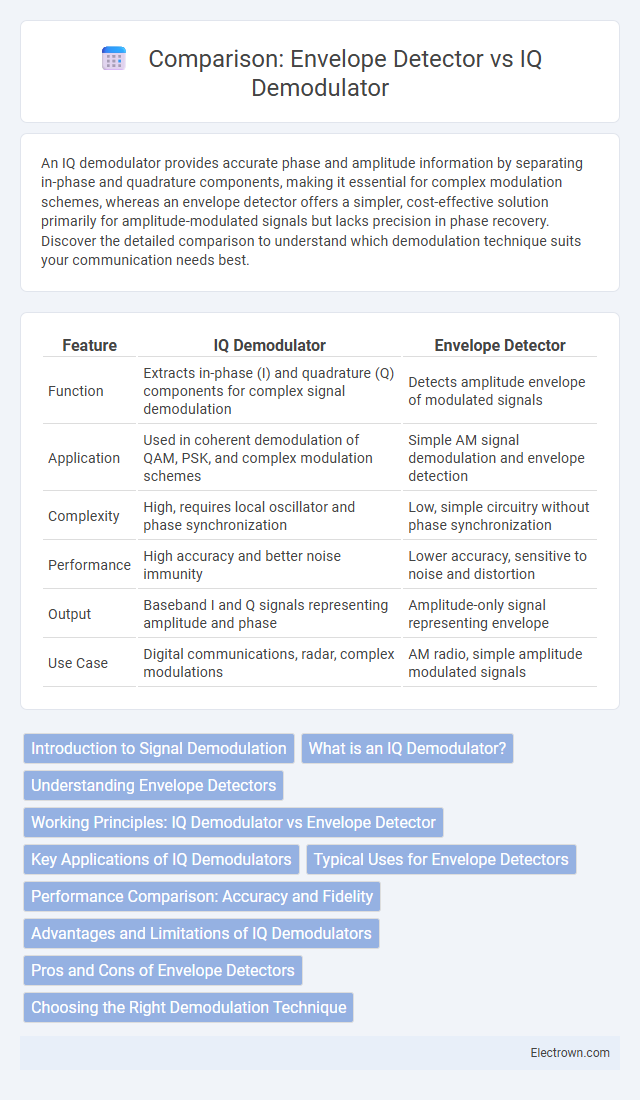An IQ demodulator provides accurate phase and amplitude information by separating in-phase and quadrature components, making it essential for complex modulation schemes, whereas an envelope detector offers a simpler, cost-effective solution primarily for amplitude-modulated signals but lacks precision in phase recovery. Discover the detailed comparison to understand which demodulation technique suits your communication needs best.
Table of Comparison
| Feature | IQ Demodulator | Envelope Detector |
|---|---|---|
| Function | Extracts in-phase (I) and quadrature (Q) components for complex signal demodulation | Detects amplitude envelope of modulated signals |
| Application | Used in coherent demodulation of QAM, PSK, and complex modulation schemes | Simple AM signal demodulation and envelope detection |
| Complexity | High, requires local oscillator and phase synchronization | Low, simple circuitry without phase synchronization |
| Performance | High accuracy and better noise immunity | Lower accuracy, sensitive to noise and distortion |
| Output | Baseband I and Q signals representing amplitude and phase | Amplitude-only signal representing envelope |
| Use Case | Digital communications, radar, complex modulations | AM radio, simple amplitude modulated signals |
Introduction to Signal Demodulation
Signal demodulation is a crucial process in communication systems that extracts information from modulated carrier waves, where IQ demodulators separate signals into in-phase (I) and quadrature (Q) components to preserve both amplitude and phase information, enabling complex signal analysis. Envelope detectors, by contrast, recover the original message by detecting the amplitude variations of the carrier, making them suitable for simpler amplitude modulation schemes. Your choice between IQ demodulator and envelope detector depends on the signal complexity and required fidelity in the demodulation process.
What is an IQ Demodulator?
An IQ Demodulator is a device used in communication systems to recover both amplitude and phase information from a modulated signal by separating it into in-phase (I) and quadrature (Q) components. Unlike an envelope detector, which only tracks the amplitude changes of a signal, an IQ Demodulator enables coherent demodulation crucial for complex modulation schemes such as QAM and PSK. Your use of an IQ Demodulator ensures improved signal fidelity and the ability to process signals with varying phase and frequency shifts.
Understanding Envelope Detectors
Envelope detectors extract the amplitude variations of amplitude-modulated (AM) signals by rectifying and filtering the received waveform, making them simple and cost-effective for demodulation in communication systems. Unlike IQ demodulators that separate in-phase (I) and quadrature (Q) components to preserve signal phase and frequency information, envelope detectors provide only the signal envelope, limiting their use in complex modulation schemes. Efficient envelope detection depends on choosing appropriate diode types and filter bandwidths to minimize distortion and accurately reproduce the message signal.
Working Principles: IQ Demodulator vs Envelope Detector
IQ demodulators separate incoming signals into in-phase (I) and quadrature (Q) components to extract both amplitude and phase information, enabling accurate reconstruction of complex modulated signals. Envelope detectors simplify demodulation by extracting the amplitude envelope of the carrier wave, effectively retrieving the original signal without phase information, making them suitable for amplitude modulation (AM) signals. Understanding these working principles helps you choose the appropriate demodulation method based on the modulation scheme and signal complexity.
Key Applications of IQ Demodulators
IQ demodulators are essential in modern communication systems for applications such as quadrature amplitude modulation (QAM) and orthogonal frequency-division multiplexing (OFDM), where precise phase and amplitude information extraction is critical. They enable coherent demodulation, improving signal quality and data throughput in cellular networks, satellite communications, and radar systems. Your choice of an IQ demodulator enhances performance in complex modulation schemes compared to envelope detectors, which are typically limited to simpler amplitude modulation.
Typical Uses for Envelope Detectors
Envelope detectors are commonly used in AM radio receivers to extract the audio signal from the modulated carrier wave, making them ideal for simple and low-cost communication systems. These detectors excel in applications involving amplitude modulation where signal complexity is low and bandwidth efficiency is not critical. Their simplicity and ease of implementation make them popular for demodulating signals in analog and RF circuit designs.
Performance Comparison: Accuracy and Fidelity
IQ demodulators offer superior accuracy and fidelity compared to envelope detectors by directly extracting in-phase and quadrature components, minimizing signal distortion and improving noise resilience. Envelope detectors provide simpler and low-cost demodulation but suffer from reduced accuracy, particularly in complex or multipath environments. Your choice depends on the required precision and signal conditions, with IQ demodulators preferred for high-performance communication systems.
Advantages and Limitations of IQ Demodulators
IQ demodulators provide precise amplitude and phase information crucial for complex modulation schemes like QAM and PSK, enabling superior signal reconstruction and carrier recovery compared to envelope detectors. They effectively handle both amplitude and phase variations, allowing better performance in multipath fading and frequency-selective channels, but require accurate calibration and suffer from increased circuit complexity and power consumption. Limitations include susceptibility to I/Q imbalance, DC offsets, and higher cost, making envelope detectors preferable in simpler amplitude modulation systems where phase information is unnecessary.
Pros and Cons of Envelope Detectors
Envelope detectors offer a simple, cost-effective solution for demodulating amplitude-modulated signals, with low power consumption and ease of implementation. However, their performance degrades in low signal-to-noise ratio environments due to poor noise immunity and limited accuracy in recovering the original modulating signal. If your application involves high-fidelity or complex modulation schemes, an IQ demodulator may provide superior performance despite increased complexity and cost.
Choosing the Right Demodulation Technique
Selecting between an IQ demodulator and an envelope detector depends on the modulation scheme and performance requirements of your communication system. IQ demodulators provide superior accuracy and phase information recovery for complex modulations like QAM, making them ideal for high-data-rate and coherent systems. Envelope detectors offer simplicity and cost-effectiveness for amplitude-modulated signals where phase information is unnecessary, ensuring reliable detection in low-complexity scenarios.
IQ Demodulator vs Envelope Detector Infographic

 electrown.com
electrown.com